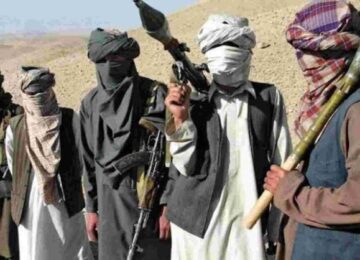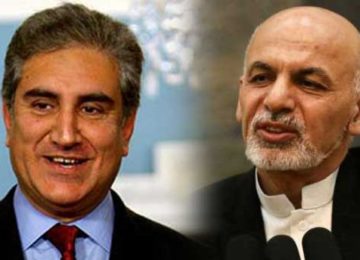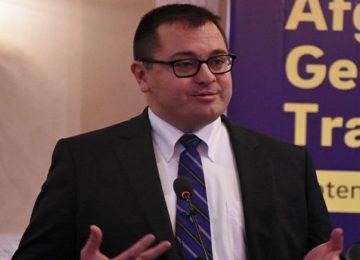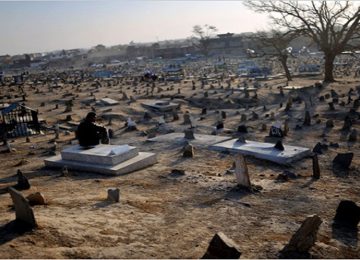Atta Muhammad Noor, a strongman who has ruled a prosperous northern Afghan province more like a king than a governor for 13 years, was driving between meetings in Dubai last month when he got the call: President Ashraf Ghani was firing him.
For three years, Mr. Ghani had tried to ease Mr. Noor, 54, a commander of the mujahedeen resistance to the Soviets who then became a warlord in the civil war and in the battle against the Taliban, out of his spot as governor of Balkh Province, the country’s commercial hub. Negotiations over a deal that would see Mr. Noor finally leave in return for more government seats for his political party faltered. And when Mr. Noor began meeting with other important regional power brokers who were also critics of the president, Mr. Ghani decided he had finally had enough. He ordered Mr. Noor out.
The Afghan president may have miscalculated.
Since returning to Balkh, not only has Mr. Noor rejected the Afghan president’s firing of him, but he is using his defiance of the American-backed administration in Kabul as a platform to project himself as a player in the presidential elections that are supposed to happen next year.
A regional power’s rejection of the central government has long been seen as a likely test for the heavily centralized but potentially fragile Afghan state set up after 2001.
Now the standoff between Mr. Noor and Mr. Ghani, which has dragged on for almost a month, has become a painfully public test of how far the United States will go to support the Afghan president against a widening, though not united, opposition.
“They were thinking I was the same as the governors they had appointed with a piece of paper and removed with a piece of paper,” Mr. Noor said last week, in an interview with The New York Times in the governor’s office. “I am the operational chief of a strong political party, I am part of a strong coalition, and the people trust me for who I am, for my charisma.”
Mr. Noor said the effort to remove him was tied to political machinations around the presidential elections next year, when Mr. Ghani wants to be re-elected, but it remains unclear how.
“We are a great capacity for votes during elections. They are trying to marginalize us, and we won’t take it quietly,” Mr. Noor said. “If my party and my allies agree, it’s possible that I will be a candidate — as the head of the ticket.”
He added: “I don’t like being No. 2.”
One event that probably contributed to Mr. Noor’s firing happened about two months ago, when fuel trucks contracted by NATO were blocked by his forces in Balkh. Mr. Noor said the trucks were using NATO’s tax-exempt status to import illegal fuel. Some officials, however, speaking on condition of anonymity to avoid angering Mr. Noor and his allies, suggested that the trucks were stopped because they were refusing to pay Mr. Noor’s men a cut.
Afghan officials say the episode angered Gen. John W. Nicholson, the top American commander in Afghanistan. Mr. Ghani’s aides used it in their lobbying against Mr. Noor, arguing that the former warlord was not only against the Afghan president, but also his American allies.
Mr. Noor appeared unconcerned.
“Nicholson should not have gotten upset,” Mr. Noor said. “Nicholson should have called me, like a man, and asked for information on what had happened.”
In December, Mr. Ghani’s government, with the help of the NATO coalition, which still controls Afghan airspace, refused Mr. Noor’s plane permission to to fly to the southern province of Kandahar to attend an opposition rally. In July, a plane carrying Gen. Abdul Rashid Dostum, the Afghan vice president who is exiled in Turkey on charges of abducting and raping an opponent and has become a strong ally of Mr. Noor, was denied landing in Balkh, where he was supposed to attend a rally organized by Mr. Noor.
Through it all, Mr. Noor has been trying to stay afloat, and some even see his meetings as the moves of a potential candidate who is testing his prospects for a bigger move. According to several Afghan officials, those meetings included one in Dubai last month with Erik D. Prince, the former chief executive of the Blackwater private security firm, who has recently proposed a greater role for privatized security and intelligence operations in Afghanistan.
Mr. Noor would not confirm those reports of a meeting with Mr. Prince, who has ties to the Trump administration and whose sister, Betsy DeVos, is the education secretary. But he was clear about seeking channels for American support. “I saw strong people who have connections to the White House,” Mr. Noor said.
As successor to Mr. Noor, Mr. Ghani’s government announced Mohammed Dawood, a former guerrilla from Mr. Noor’s faction who, for the past two decades, has lived in London and run a luggage shop there. Denied entry into Balkh, Mr. Dawood has set up office in the diplomatic quarters in Kabul, where, in preparation for a future role that may never materialize, he has dyed his beard pitch black, ordered new three-piece suits, and appointed a spokesman who represents him on television shows.
“Right now, I am waiting to hear what the government says. It is totally up to them to decide when and how to take me to Balkh,” Mr. Dawood said during an interview at the guest house the government has provided for him in Kabul.
Mr. Noor sees Mr. Dawood as “an exhausted tool against me” and says there is no way the man could become governor. The crisis could only be resolved through negotiations with his party, which are ongoing in Kabul, he said.
Mr. Noor’s military and political reputation has been deeply tied to his home province for decades, and it has given him deep leverage with both the West and the government in Kabul. About $1.7 billion worth of goods transited through just one of Balkh Province’s ports last year, including fuel contracted by NATO. Mr. Noor is also believed to have armed militias in the north, which Human Rights Watch has accused of extensive abuses.
Over 15 years, Mr. Noor has developed a vast network of businesses and patronage centered on Balkh and the city of Mazar-i-Sharif, long a center of trade and interaction with Central Asia. Those relationships have brought him and his allies wealth that affords them a lavish lifestyle, but also resources for a network of militia commanders across several provinces.
In trying to take Mr. Noor down, Mr. Ghani’s aides have portrayed him as helplessly corrupt, saying that he takes a cut from every business, and that he has hundreds of millions of dollars sitting in foreign bank accounts. But Mr. Noor insists that his income has come from clean business dealings, and that his profits have all been piled into his network of supporters and his political efforts.
For months before his firing, an aloof Mr. Noor had mostly not bothered to show up at the governor’s office in Mazar. He attended to only the most serious of government business from one of his homes or guest houses, decorated with large chandeliers, golden faucets, and more than a dozen portraits of their owner.
But as soon as he was fired, he started showing up to the office every day. Behind multiple layers of security, Mr. Noor now meets hundreds of people daily, giving rousing speeches that are broadcast live on several national television channels. And he has repeatedly used the language of force.
One of the most frequent targets of his verbal abuse has been Abdullah Abdullah, a former Northern Alliance figure who now serves as Mr. Ghani’s coalition partner in the Afghan government.
“I will smash your teeth!” Mr. Noor said in a callout to Mr. Abdullah, a former ally whom he now denounces as a sellout to Mr. Ghani.
Last Thursday, Mr. Noor, wearing black clothes and sunglasses while ferried in a convoy of gloss-black armored vehicles, arrived at the governor’s office late in the afternoon. His aides said he had been up much of the night, pacing the room on the phone or holding private audiences with visitors from Kabul.
As he listened to a long list of speakers in one auditorium, visitors were being seated into two adjacent halls where Mr. Noor would speak next. He seemed tired, trying to hide his yawns as speaker after speaker called him lion, king, emperor. To each platitude, Mr. Noor simply bowed his head, his hand on his chest.
But when Mr. Noor took the podium, there was no sign of exhaustion. Once again, he lashed out at the government in Kabul. He said his party leaders were trying to negotiate a solution in the capital, and that would be the only way out. But he asked his supporters to be ready for civil protest — to have their “old tires” ready for burning to block roads.
The speech quickly turned into an election rally, with Mr. Noor saying the leaders of the government in Kabul were blind to Afghans’ suffering through years of war.
“If I become president one day … ” Mr. Noor said, baiting the crowd. And they roared in response.
Then, gripping the podium — a $27,000 Omega watch on his wrist, a garnet ring with a halo of about 20 small diamonds on his finger — Mr. Noor talked about corruption. He said the central government was rife with graft, as the two coalition leaders fattened their own allies.
While a teacher was making $200 or less a month, he said, Mr. Ghani and Mr. Abdullah were paying hundreds of useless advisers $5,000, $6,000, or more. And how much was the cost of renting an armored vehicle for each adviser?
“They are sucking the blood of the people,” Mr. Noor said.
This article originally appeared on www.nytimes.com on January 15, 2018. Original link.
Disclaimer: Views expressed on this blog are not necessarily endorsed or supported by the Center for Research and Security Studies, Islamabad.








